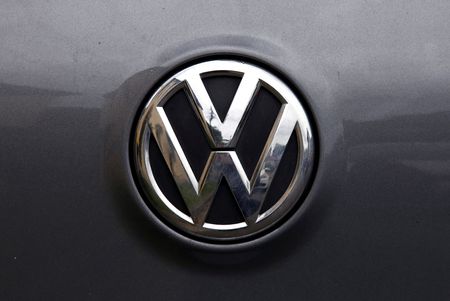
By Victoria Waldersee
BERLIN (Reuters) – Volkswagen reported third-quarter earnings of 4.3 billion euros ($4.29 billion), behind pre-pandemic levels, following 1.6 billion in one-off effects from the suspension of Russian activities and its Porsche AG listing.
Margins across the group were 6%, but Volkswagen maintained its outlook for the year of the upper end of a 7%-8.5% earnings margin given a strong recovery in the Chinese market and improved semiconductor supply.
Earnings meanwhile were boosted by a 19.4% margin in the sports and luxury brands, which are more able to pass on rising costs by hiking prices than volume brands whose buyers are squeezed by inflation.
Europe’s top car maker said it expected deliveries to be around the same as last year, after reporting earlier this month that they were down 12.9% in the first nine months. In May it had predicted a 5%-10% rise.
Volkswagen’s shares fell 2.7% in early trade, underperforming Germany’s DAX, which fell 0.8%.
The results beat last year’s third quarter when chip shortages reduced sales across the auto industry, but they lagged pre-pandemic profits even as luxury carmakers, such as Mercedes-Benz caught up with 2019 earnings this quarter.
Porsche has overtaken its former parent Volkswagen as Europe’s most valuable carmaker following its listing in September.
Volkswagen’s difficulties also included a 1.9 billion euro non-cash impairment charge resulting from the write-down of its investment in Argo AI, a self-driving startup it jointly owned with Ford Motor Co.
Ford and Volkswagen joined forces in July 2019 to share control of the Pittsburgh-based company developing technology for driverless vehicles, which will shut operations.
VW’s initial investment was valued at $2.6 billion, including $1 billion in cash and the $1.6 billion value of Volkswagen’s European self-driving unit, which was absorbed into Argo. VW also bought Argo shares from Ford for $500 million.
Both companies shifted spending from the business on Wednesday, dragging Ford into a net loss with a non-cash pretax impairment of $2.7 billion.
($1 = 1.0022 euros)
(Reporting by Victoria Waldersee, editing by Rachel More and Barbara Lewis)

